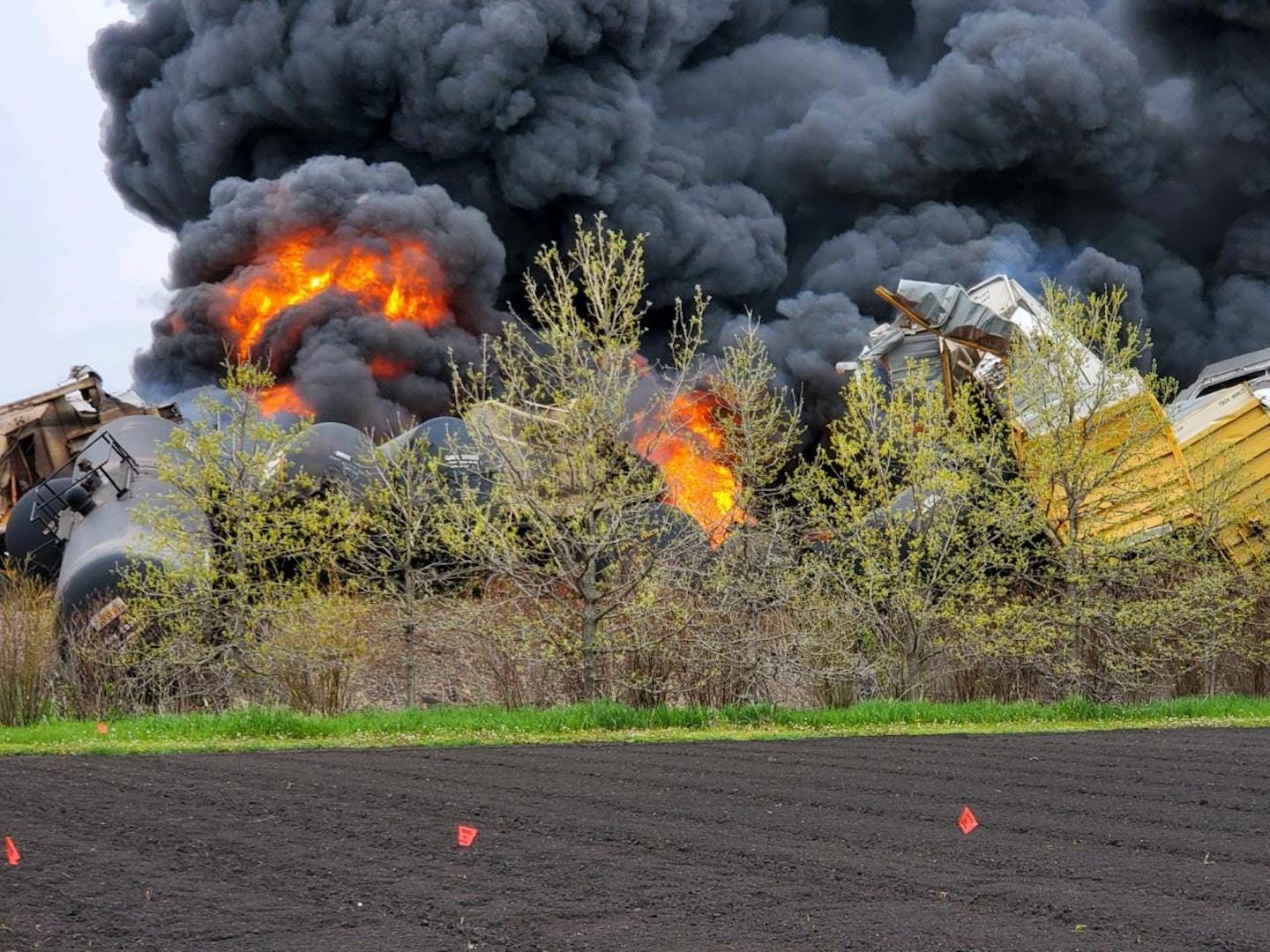Reflections of Two Years on the Freight Rail Beat
Now that everyone seems to care about freight rail, at least for a second
Photo credit: EPA
Two years ago, I wrote an article titled: “‘It’s Going to End Up Like Boeing’: How Freight Rail Is Courting Catastrophe.” It would be an overstatement to say nobody cared. The article did well, and our news show also aired a segment about it, which also did well. But it would also be an overstatement to say the story had any impact. It may have contributed to Congress asking the Government Accountability Office to do a study on precision scheduled railroading. That study came out in December and it simply repeated industry and labor talking points, offering no new insight or information. But as far as “impact” goes, that’s all I have to offer.
But I kept writing about freight rail’s dance with disaster. After Congress forced angry workers back to work a few months ago, I wrote another article titled “The Freight Rail Labor Dispute Was Never About ‘Sick Days.’” In that piece from December, I said:
Time and again, I heard from railroad workers that they viewed this contract negotiation as their last, best hope to fight back against corporate greed, against a way of running the railroads that violated every conceivable principle of basic human decency. Some railroad workers I spoke to simply wanted to improve their working conditions, but many more spoke in grander terms. They thought a strike would be in the country’s best interest, even if it led to short-term pain, by calling attention to—and, ideally, forcing the end of—a management style that hurts everyone.
Three months after that story published, a freight train derailed in East Palestine, Ohio. I wrote an article about that, too: ‘32 Nasty:’ Rail Workers Say They Knew the Train That Derailed in East Palestine Was Dangerous.
The headlines of my articles on the freight rail beat tell a very clear story: Workers have known for years the railroad is getting increasingly dangerous, that something like East Palestine was increasingly likely, perhaps even inevitable. You didn’t even have to be plugged into the freight rail scene to know about it. After all, I managed to find out about it despite having less than zero expertise on freight rail at the beginning of 2021. But, they couldn’t get anyone with the power to do anything about it to listen or care. They wanted to exercise their power to strike to force the change they thought was necessary, but Congress wouldn’t let them.
I’ve done several media hits in the weeks since East Palestine made international news, and I often get asked some version of the same question. For example, When I was on All Things Considered, the host asked me, “So given all of your previous reporting, I'm just curious personally. What was your reaction to seeing an accident of this magnitude take place?” I replied:
I think more telling than my reaction is the workers' reaction. Absolutely none of them were surprised. Absolutely none of them were shocked. Absolutely none of them were even the least bit caught off guard that this had happened. I think some of them wondered why it had actually taken so long for something like this to happen. And overall, absolutely none of them expect anything to change because they don't think it was actually bad enough.
The workers have good reason to think that. Another radio hit I did was on CBC. Canada knows a thing or two about train disasters. Ten years ago, a runaway train with 72 tank cars filled with liquid petroleum coasted down a hill and crashed through the town center of Lac-Megantic, Quebec. The train became a giant bomb and killed 47 people, destroyed 40 buildings, and spilled millions of gallons of oil into the soil and river. The worker operating the train was exhausted, overworked, and stressed, and as a result overlooked a safety protocol, among other contributing factors from drastic cost-cutting at the railroad that resulted in the tragedy. Here’s what the show’s host, Jayme Poisson, had to say about the legacy of Lac-Megantic:
You know, it's interesting watching the political conversation that has ignited around this disaster, though, in the last week or so, because it does feel like it very clearly mirrors the conversation that we had after Lac-Megantic here. Basically, there was a lot of criticism directed at the company, but also at the federal government for deregulating the industry, essentially. Criticism of corporate negligence, but paired with regulatory failure that that the railway lobby had captured the government. Some changes were made, requirements for handbrakes and two person crews. But I just want to mention for our listeners that a lot of people have still expressed serious concerns, including our Auditor General, who in 2021 released a scathing report saying that the government here had failed in implementing recommendations.
Between the lessons of Lac-Megantic and the company I mentioned in the headline of my first article about freight rail, Boeing—which has not fundamentally changed how the regulatory agencies oversee the manufacturer or any of the regulations that govern them—it is difficult to feel optimistic about the future of freight rail safety, that we as a country will actually learn any of the important lessons here. What is far more likely is Norfolk Southern and the other railroads will nod along to token “reforms” that don’t alter anything of consequence until politicians get distracted with the newest scandal, a time frame that increasingly is measured in days rather than weeks or months.
Some people have expressed surprise at what they described as my ability to identify the next big story before it happens, first with the USPS in 2020 and now with freight rail. But it’s pretty easy to predict which issues will keep occurring in a country that never learns from its mistakes.


